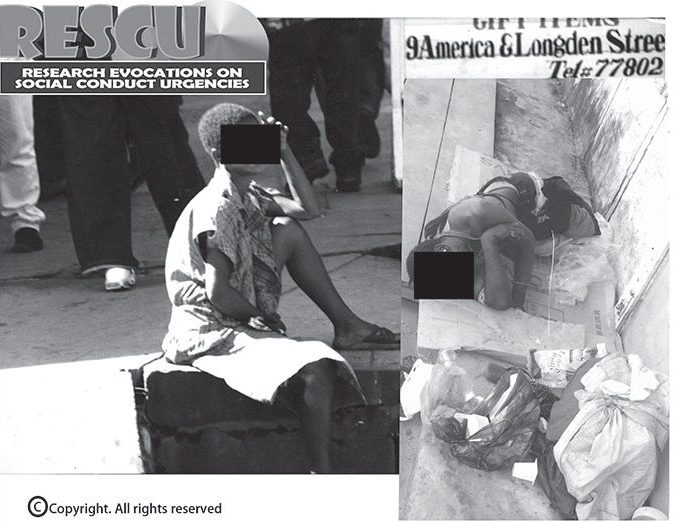To face the monster of ‘DRUG’ addiction within Part I
WHEN over two decades ago a stalwart in our Arts community came out and confessed his son’s battle with addiction, I found it admirable and the breaking of the pretentious secrecy that was counterproductive to providing remedies for anything. I had no such problem then; my children were small. However, I committed myself upon purchasing my first camera to address this creature my brethren called ‘DE JUMBIE’ before then.

I was well aware that there were ‘date-rape drugs, mostly M-X and other stuff spoken about, that was looked down upon by my then youth peers as used by losers taking advantage of women they didn’t have the ‘swaare’ to win a natural relationship with; we thus viewed them with contempt. Drugs were perceived as a way out of generational poverty by most of the people doing it in the late ‘70s early ‘80s, others in the business were purely callous, unconcerned about anything except their own benefits; the reality for most of ‘the other’ with limited or no collateral embraced narco-trafficking, instead of falling into a banking system with interest rates that were not collaborative with our limited market capacity, as the profound saying goes, “The road to hell is paved with good intentions.” There were two brothers from Kitty whom I had implored not to deal cocaine in Guyana because of my limited knowledge then of how destructive this drug is, most homes would not be able to deal with addicts, they argued that it was going to ‘Big Babylon’ and since everybody was broke here, it would make a difference; one brother died here, suspected to have been poisoned; the other in Brooklyn, in a vicious drug war between mainly Guyanese that took over 100 lives that spilt over to Guyana. The addict (Junkie) explosion in Guyana was a consequence of all this, and more, it is on that condition that we must focus.
Most times when addiction or any frightening behaviour hits the home, we are surprised because there are no indicators that can be identified by the things we do that may have inspired or sent a message of normalcy as to this, or that offensive custom of practice or sub-culture, we are conditioned to assume that what we do and say to our children will be the principles and sensible guidelines for what our children will follow. We assume that our child will act rationally; the fact is that our offspring are separate ‘beings’ that may, or may not, for no rational reason given, act this way or that way based on, or counter to the script we preach to them, and it’s not the fault of parents that there are language modules outside of our narrative that we have never imported just in case, words like ‘Hallucinogen’ and ‘Narcotics’ were not words used in secondary school, or in the home, as part of common discussions. From experience, I can assure that the addict evolves in its stages of retrogression, what we see on the road, by Bourda market, through Cross Street or anywhere else took years. Years that left families broken in mind and spirit, destroyed plans of natural development to explore the forced or coerced redemption of a loved one, out of the expected call of ‘Duty’, unknowing that this is a battle against a tremendously powerful enemy, that can truly conduct a grotesque metamorphosis, in the most unconquered anatomical area of the human body-the brain and the neural system; ahead of the consequential deterioration of the entire soul (body); an addict in the home embraced by a family intended to redeem its loved one will gradually lose aspects of its normalcy, because in many ways the addict becomes the enemy within.
With the charge of my experience, I became a witness to the lives of other victims, I say ‘victims’ because the people who empower themselves through Drugs, and foreign states have done this intentionally, but my reference lies with the addict in Guyana, they are victims of people and groups in local organisations, who know and care less for the human consequences. Thus, victims is a suitable term for addicts, whether the victim’s ego or mental weakness through social breakdowns around the person, permitted the entrance of drugs as a placebo, or to suffice peer accommodation.
The first act towards redemption is acceptance of personal contribution to the condition, and even if a gesture is made acknowledging that from the addict, beware, it can change and be replaced almost moments after with a proposition of accusations and blame directed at the very people who constitute the ardent support group of mainly relatives. The addict seeks coherence; like nations and peoples, the propositions crafted will not be based on ‘the truth’ or even a partial truth to justify coherence. Blame is an important part of the arsenal of defence against the support group, to justify the experience of continuous drug usage. Drugs consist of cocaine-based constructs, marijuana, alcohol and the serious underrated over the counter pharmaceuticals or medications.
Addicts are among the more convincing liars because we relatives fail to acknowledge the impact of drugs on mental health, and in our need to retake the life of a relative and to return ourselves to normalcy, we can be vulnerable. The more we know is the better our judgement in every case, the addict is not the advocate of his/her own redemption; first a mind at large has to be grounded. On 21 October, 2019, Guyana launched its Drug Treatment Court, this facility is a tremendously positive step taken, but nevertheless, a work in progress, as the task before them has grown since the 1980s. We conclude our discussion next week.




.jpg)










